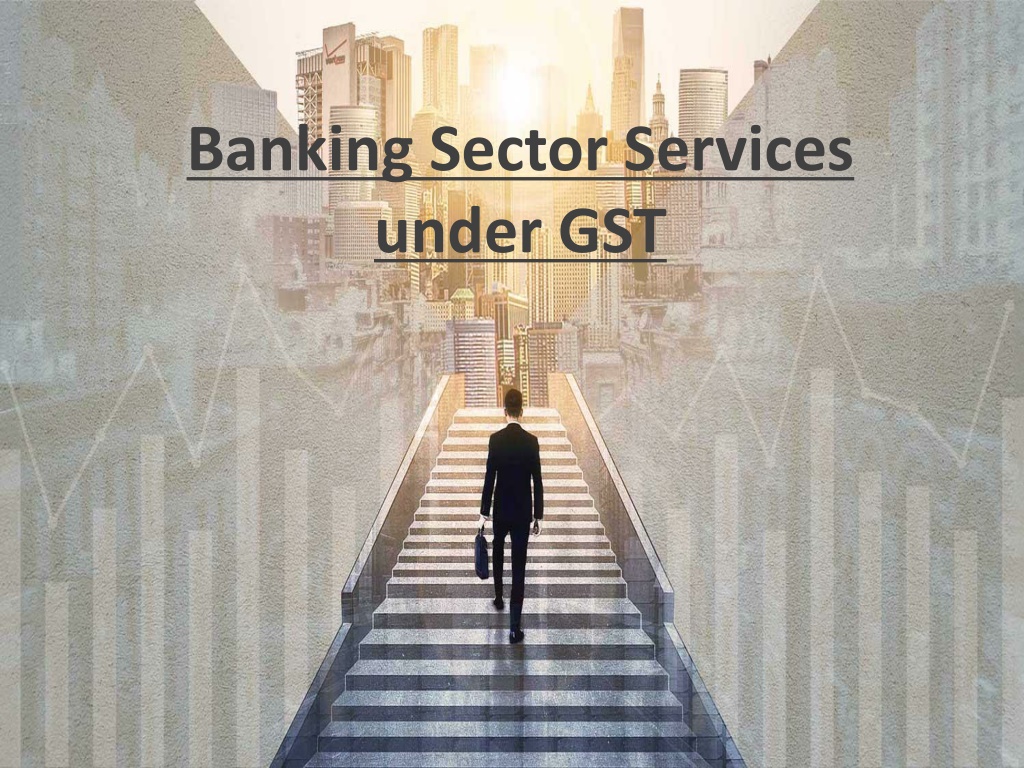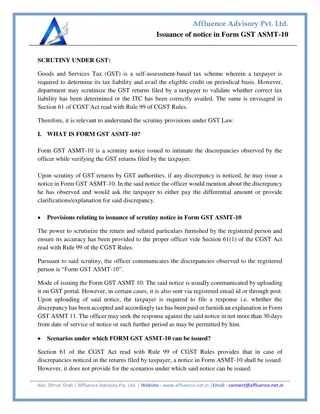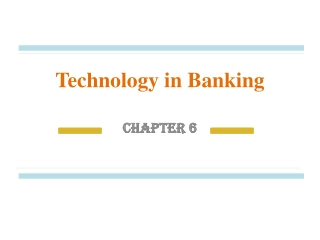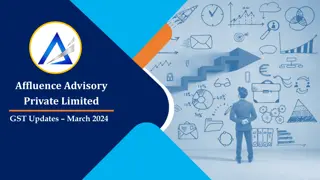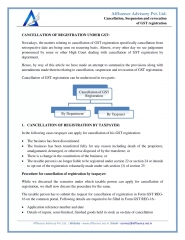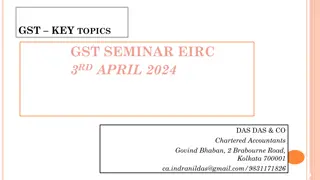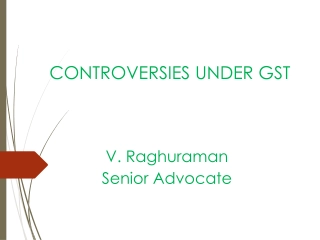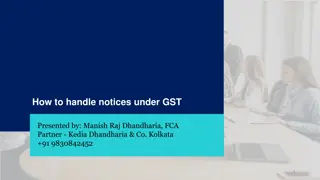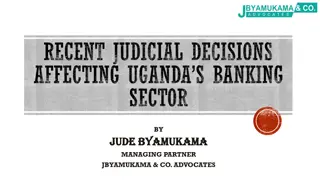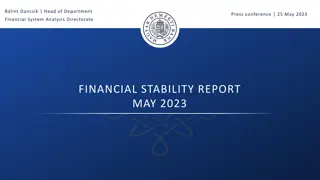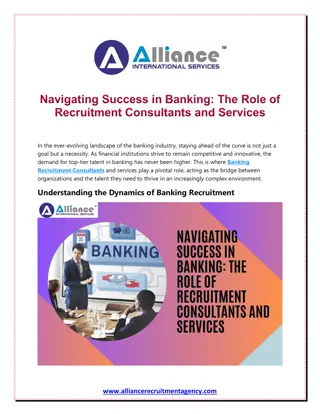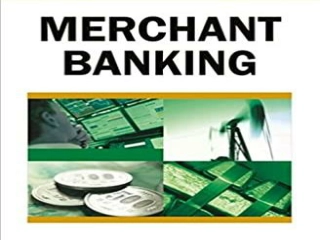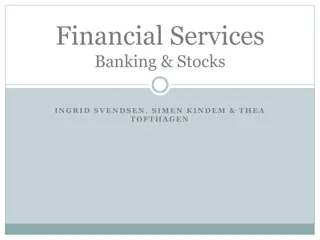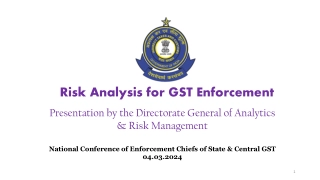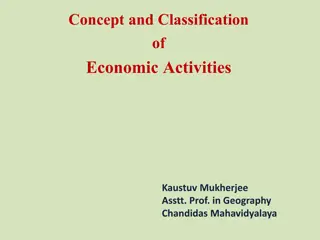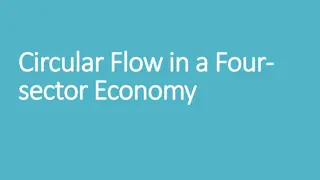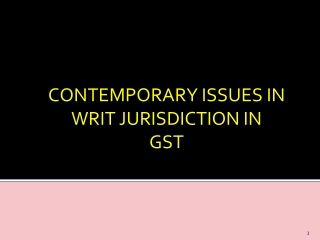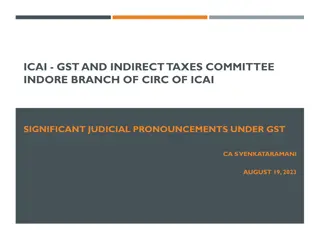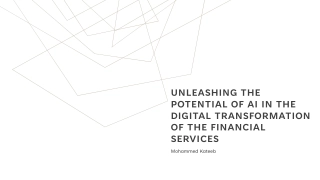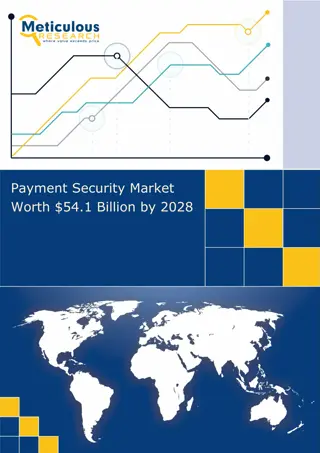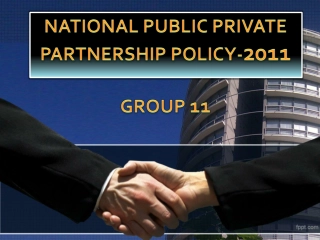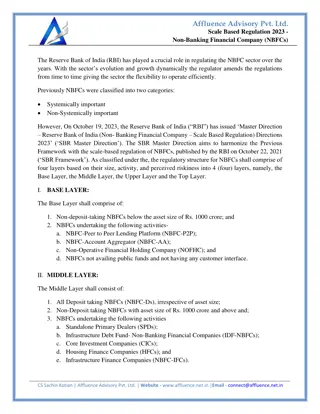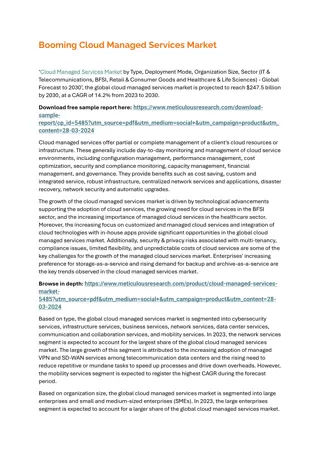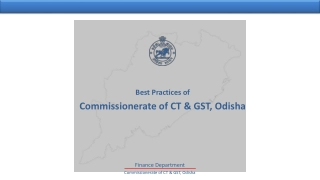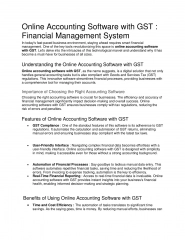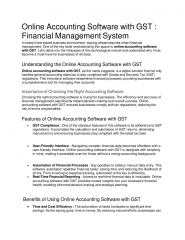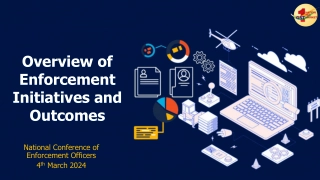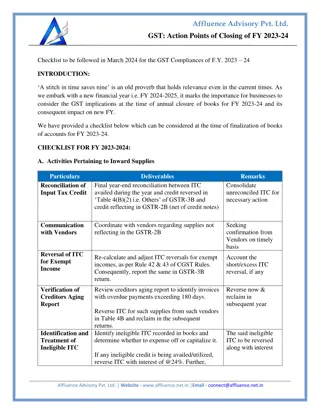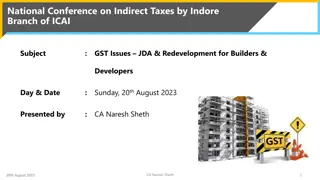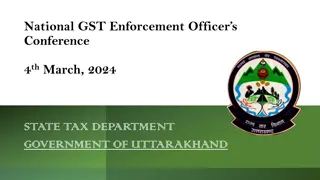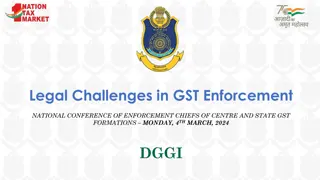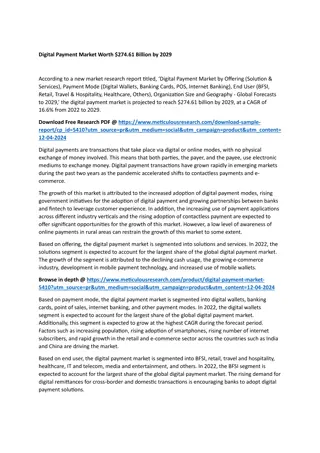Banking Sector Services under GST
The banking sector services under GST encompass a range of offerings including wealth management, wholesale banking, retail banking, investment assistance, and asset management services. Banks serve as brokers and portfolio managers, charging fees for their services. Revenue is generated through lending, discounting bills, interest on loans, credit card facilities, and debit card servicing. Additionally, financial leasing and hire purchase arrangements contribute to revenue sources in the banking sector.
Banking Sector Services under GST
PowerPoint presentation about 'Banking Sector Services under GST'. This presentation describes the topic on The banking sector services under GST encompass a range of offerings including wealth management, wholesale banking, retail banking, investment assistance, and asset management services. Banks serve as brokers and portfolio managers, charging fees for their services. Revenue is generated through lending, discounting bills, interest on loans, credit card facilities, and debit card servicing. Additionally, financial leasing and hire purchase arrangements contribute to revenue sources in the banking sector.. Download this presentation absolutely free.
Presentation Transcript
Banking Sector Services under GST
Business segment Wealth Management Services Wholesale Banking Retail Banking Other services- It investment assistance and asset management services. captioned banks act as a broker as well as portfolio manager for their clients and charges fees against services. refers to There other services which are rendered banks (opening locker, account, giving loans etc.) to their clients. Additional fees may be charged by the banks for services. . are certain Wholesale deals corporations, institutions, etc. Their business include lending, sale of forex and instruments, custodial services, banking assistance for mergers and acquisitions, etc. banking larger This is the most popular service provided by the bank. These services are rendered by the banks to individual commercial Operations banking are through branches and through an ecosystem platforms mobile applications. . with by a Under service, demat activities corporate and small client. retail handled physical of hedging these investment services, such of online including
primary source of revenue. The institutions lend money or enable bill discounting for their clients. Periodical interest is charged by the lenders against the loans granted and discounting charges are levied on the discounted bills Under this type of lending, Bank takes the bill drawn (for which payment is due on a later date) by borrower on his (borrower's) customer and pays him immediately deducting some amount as discount/commission. Interest Revenue on Loans and Bill Discounting / Net Interest Margin Banks/FIs issue credit cards to their customers, which can be used at various merchant outlets for buying consumer products or services procured online or offline. Bank/FI allows a credit period for repaying the outstanding amount utilized for making purchases/payments. In case of late payment of credit card outstanding amount, bank charges interest and late fees to said customers. Credit Card Facility Periodical charges for servicing of debit card are levied by the bank and are paid by the account holders. Debit card facility
REVENUE SOURCES Lease & Hire Purchase (a) Financial Lease- It refers to commercial arrangement in which the lessor allows the lessee to use the asset for the maximum part of its economic life against payment of rentals is known as finance lease. A finance lease is essentially a commercial rental agreement where the following steps take place: Step 1: The lessee selects an asset that they require for a business. Step 2: The lessor, usually a finance company, purchases the asset. Step 3: The lessor and lessee enter into a legal contract in which the lessee will have use of the asset during the agreed upon lease. Step 4: The lessee makes a series of payments for the use of the asset. Step 5: The lessor recovers the cost of the asset plus interest. Step 6: At the end of the lease agreement, the lessee has the option to acquire ownership of the asset.
Operating lease It refers to commercial arrangement in which the lessor allows the lessee to use the asset for a term smaller than the economic life of the asset against the payment of rentals is known an operating lease. Both operating leases and finance leases allow a company to rent and use an asset. However, the main difference is that under a finance lease, the lessee conveys ownership of the asset. Installment payments for assets leased under an operating agreement are recognized as a rent expense on a balance sheet. They are recorded in financial statements under the cost of sales or operating expenses. This is different from a finance lease, where the payments for the leased asset are recorded as an amortization expense and interest expense. Lessees involved in an operating lease are not liable for the same risks as lessees involved in a finance lease. In an operating lease, the lessee is simply renting the asset and only has the right to use. This means that the lessor retains all of the risks and benefits associated with the asset. In addition, the lessor is responsible for all maintenance or repair costs.
Hire Purchase- HP is a financing solution suitable for businesses wishing to purchase assets without paying the full value immediately. The customer pays an initial deposit, with the remainder of the balance and interest paid over a period of time. On completion, ownership of the asset transfers to the customer. Securitization or assignment of receivables- Securitization is the financial practice of pooling various types of debts, both secured and un-secured, such as residential mortgages, commercial mortgages, auto loans or credit card debt obligations (or other non-debt assets which generate receivables) etc. and selling the right to receive the re-payment of such debts to third party. Other Value-added services Value added services may be issuance of cheque books, demand drafts etc. These services are billed separately as they are provided in addition to the routine services or considered as separate transactions. Point-of-sale machine service given by the banks. Cheque processing charges incurred by co-operative banks who have a local base and rely on partner banks to process cheques. service of facilitating UPI transactions by processing and clearing the transaction requests. Applicability of charges depends on the nature of transactions.
SUPPLIES MADE BY BANKING INSTITUTIONS
Exempt supplies (Notification No. 12/2017 CTR ) S.No Entry No. SAC Description 1 27(a) 9971 services by way of extending deposits, loans or advances in so far as the consideration is represented by way of interest or discount (other than interest involved in credit card services); 2 27(b) 9971 services by way of inter se sale or purchase of foreign currency amongst banks or authorized dealers of foreign exchange or amongst banks and such dealers 3 27A 9971 Services provided by a banking company to Basic Saving Bank Deposit (BSBD) account holders under Pradhan Mantri Jan Dhan Yojana (PMJDY) 4. 34 9971 Services by an acquiring bank, to any person in relation to settlement of an amount upto two thousand rupees in a single transaction transacted through credit card, debit card, charge card or other payment card service. 5. 34A 9971 Services supplied by Central Government, State Government, Union territory to their undertakings or Public Sector Undertakings (PSUs) by way of guaranteeing the loans taken by such undertakings or PSUs from the 31[banking companies and] financial institutions. 6. 37 9971 services by way of collection of contribution under the Atal Pension Yojana 7 38 9971 provides that services by way of collection of contribution under any pension scheme of State Govt. 8 39 9971/ 9985 Services by the following persons in respective capacities (a) business facilitator or a business correspondent to a banking company with respect to accounts in its rural area branch; (b) any person as an intermediary to a business facilitator or a business correspondent with respect to services mentioned in entry (a); or (c) business facilitator or a business correspondent to an insurance company in a rural area. 9 39A 9971 Services by an intermediary of financial services located in a multi services SEZ with International Financial Services Centre (IFSC) status to a customer located outside India for international financial services in currencies other than Indian rupees (INR).
Services under Reverse Charge Services provided by recovery agent to a banking company or financial institution or a non-banking financial company would be liable to tax in the hands of recipient. Services provided by business facilitator (BF) to a banking company is liable to tax in the hands of recipient. Services supplied by individual Direct Selling Agents (DSAs) other than a body corporate, partnership or limited liability partnership firm to bank or non-banking financial company (NBFCs) is liable to tax in the hands of recipient.
Taxable services All other services except than those which exempted and taxable under RCM are covered by Entry no. 15(vii) of Notification No. 11/2017 CTR. Above services are taxable @18% . S.no. Services 1 Any penalty recovered for late payment of loan equal monthly installment or penal interest charged or for-closure etc. 2 Other charges (if any) levied by the banks relating to loans. 3 Charges collected in the course of transfer or assignment of a debt. 4. Interest recovered from the customer for late payment of outstanding beyond the due date. 5. any other charges, viz., annual charge, processing charges on EMI etc., which are levied in connection with the credit card 6 Transactions processed through POS terminals from merchant. 7 Merchant Discount Rate [MDR] charged by Acquiring bank to merchant establishment on every card transaction. 8 Lease & Hire Purchase 9 Charges collected as agency charges , enablement charge or facilitation fee or simple management fee . 10 Accounting maintenance charges, locker charges, debit /credit card charges, internet banking charges 11 Purchase or sale of foreign currency, including money changing 12 Promotional offers to promote the use of card by way of issuance of cashback and discount schemes to the customers.
Inter branch transactions Banks frequently engage in service transactions with sister concerns and entities in the group operating in similar domain. Valuation of such transactions should be carefully studied to ensure GST is discharged on the value of supply which is un-influenced by relationship between the parties. Second proviso to Section 17(4) of the CGST Act provides that restriction of 50 % credit reversal does not apply in case of supplies between distinct persons. This may be relevant to determine the value of service between related/ distinct persons in accordance with valuation provisions under GST law.
Place of supply in case both the supplier and recipient are located in India- the place of supply of banking and other financial services, including stock broking services to any person shall be the location of the recipient of services on the records of the supplier of services. The place of supply shall be the location of the supplier of services where the location of recipient of services is not on the records of the supplier where the location of supplier or recipient of service is outside India then in such case the place of supply of services, shall be the location of supplier of services.
AVAILABILITY OF ITC Under GST law, a Banking Company or a financial institution including a non-banking financial company, engaged in supplying services by way of accepting deposits, extending loans or advances shall have the option to either comply with the provisions of Section 17(2) i.e. avail proportionate input tax credit on exempt and taxable supplies (and reverse ineligible input tax credit in terms of Rule 42 of the CGST Rules) or avail of, every month, an amount equal to 50% of the eligible input tax credit on inputs, capital goods and input services in that month and the rest shall lapse.
Issues/Document to be considered for verification Banks opting for option under Sec 17(2) Banks opting for option under Sec 17(4) A C B It will be essential to understand the processes of segregation of eligible credit. The limitation percent credit shall not be applicable on the intra-bank transactions. Such Banks will have to determine how much credit is attributable to outward taxable and exempt supply It whether taxpayers have availed the option under Section 17(2) of the CGST Act or under Section 17(4) of the CGST Act. Depending on the option exercised whether taxpayer required to reverse 50 percent credit or undertake proportionate reversal in terms of Rule 42 of the CGST Rules. has to be verified of 50 is
Distribution of ITC by ISD A taxpayer is required to get registered in each state from where it is making taxable supplies. Therefore, it may have various offices such as head office, registered office, regional office, marketing office, branch office in various states. It may be the case that Head office may avail various common input services on behalf of other offices and pay GST on such procurements. In this case, the taxpayer may obtain ISD registration for one office for availment of ITC on common input services which is then distributed to other units. Example of common expenses would be security services, telecommunication charges, housekeeping expenses, third party audit, legal and professional services etc. courier expenses,
Issues/Documents to be considered for verification: Whether ISD distributor has correctly bifurcated eligible and ineligible ITC in terms of Section 17(5) of the CGST Act and distributed credit accordingly. The ITC transferred through ISD can be tallied with the trial balance of Head office to ensure that the ITC has been correctly availed for further distribution. or it needs to be verified whether ITC transferred through ISD pertains to the expenses incurred by those respective units and such units are eligible to utilize the said ITC. Further, it needs to be verified whether the recipient of ITC has correctly reversed the ITC as per the availed option under Section 17 of the CGST Act.
Check Points Valuation in case of repossessed assets In case of valuation of repossessed assets, the auditor needs to obtain list of loans which are recovered through sale of the mortgaged asset Valuation of such asset shall be checked from GST perspective. For this purpose, the purchase price of the asset shall be verified Sale amount of the resold asset shall be verified Interest Revenue on Loans and Bill Discounting Understanding of the sources of earning interest revenue is to be taken at the initial stage of the audit. Walkthrough of the interest revenue recognition process through the system, to understand the completeness. All the revenues mentioned as interest revenue, shall be checked whether they qualify the definition of interest or discounts as per GST Law. Overall revenue sources should also be analyzed to understand any implication of GST.
Checkpoints Credit Card Facility Understand overall credit card models of the FI. Understanding how the credit card fees, penalties, credit card interest charges, etc. are accounted for to determine impact of GST. Lease Purchase Identification lease transaction and understanding classification determine appropriate impact of GST Residential spaces taken on employee applicability of reverse charge mechanism and blocked ITC on such lease rentals Import of services Scrutiny of foreign expense GLs will give additional about the foreign currency done. & Hire the of the insights the to the payments lease housing for the
Checkpoints Taxability of foreign payment realization, rendered by banks: Foreign payments realization services given by financial institutions should be understood to determine whether the said transaction qualifies to be Pure agent service or will be considered as separate revenue source. This check can be done on a broad category of such services to evaluate whether it is pure agent service or not. GST implications on services provided by banks in relation to loan transfer to individuals. The loan holders may opt to transfer their outstanding loan from one financial institution to another financial institution. For such service, the financial institution's may charge a loan transfer fee. Issues/Documents to be considered for verification: The details of fees charged for such transactions may be sought from the bank and accordingly, it has to be analyzed whether GST has been correctly discharged. Payments Point-of-sale machine: Place determination from the records of the supplier or the bank can be checked for transactions based on value, nature, etc. through of supply sample GST implications on other charges GST implication on other charges such as forbearance charges may have to be analyzed.
General verification procedures -: The following documents and procedure may be referred to verify the GST liability: Reconciliation of Financial statement with Form GSTR-1, Form GSTR-3B and GSTR-9 to verify outward and inward supply Verification of related party transactions reported in the Financial statement Verification of the supporting working of column 5O of Form GSTR 9C to under the nature of incomes where GST has not been paid Verification of expense wise ledger particularly in cases where liability is required to be paid under RCM or cases where ITC is restricted Verification of foreign exchange GLs from the export and import(service) point of view
